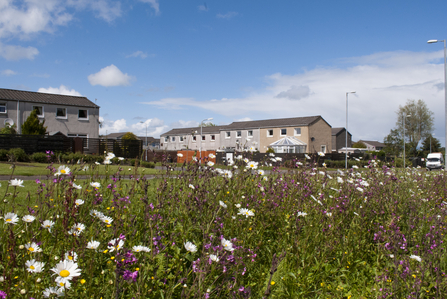
Oxeye daisies growing along a road. Photo by Mark Hamblin/2020VISION
How to lobby your local authority councillors
Councillors are elected by their local community in order to make decisions about local services, agree the local authority budget and set the policy framework as well as appointing chief officers and making constitutional decisions.
The primary role of a councillor is to represent their ward and the people who live in it. All councils have a ‘duty to involve’ the public and must provide opportunities for the public to hold them to account.
There are lots of different types of councils in England at county, district/borough and parish/town levels. Each type of council has different responsibilities. For example, a District Council is usually responsible for services including planning, council housing, and rubbish collection. A County Council is usually responsible for services including education, social services, transport, roads (except trunk roads and motorways), public rights of way, and libraries. A council’s exact remit can vary from area to area. You will need to make sure you are contacting the council that has decision making powers on the issue you want to raise. We have three different council structures within our three counties.
Oxfordshire

Oxfordshire County Council: responsibilities include schools, major road maintenance, waste and recycling centres, transport planning, on street parting. Click here for a full list.
District and Borough Councils: responsibilities include planning, environmental health, waste and recycling collection, minor road maintenance, parks, car parks and street furniture. Click here for a full list.
Cherwell District Council: www.cherwell.gov.uk
Oxford City Council: www.oxford.gov.uk
South Oxfordshire District Council: www.southoxon.gov.uk
Vale of the White Horse District Council: www.whitehorsedc.gov.uk
West Oxfordshire District Council: www.westoxon.gov.uk
Parish and town councils: responsibilities include managing parks, car parks, footpaths, community centres, cemeteries, allotments and other local amenities.
Buckinghamshire

Oxeye daisies growing along a road. Photo by Mark Hamblin/2020VISION
Buckinghamshire (Unitary) Council: responsible for education, highways, transport planning, passenger transport, social care, housing, libraries, leisure and recreation, environmental health, waste collection, waste disposal, planning applications and strategic planning.
Parish and Town Councils: responsibilities include managing parks, car parks, footpaths, community centres, cemeteries, allotments and other local amenities.
Berkshire

2020VISION
District and Borough Councils (unitary authorities): responsible for education, highways, transport planning, passenger transport, social care, housing, libraries, leisure and recreation, environmental health, waste collection, waste disposal, planning applications, strategic planning and local taxation.
Reading Borough Council: www.reading.gov.uk
Slough Borough Council: www.slough.gov.uk
Royal Borough of Windsor and Maidenhead: www.rbwm.gov.uk
West Berkshire Council: www.westberks.gov.uk
Wokingham Borough Council: www.wokingham.gov.uk
Parish and Town Councils: responsibilities include managing parks, car parks, footpaths, community centres, cemeteries, allotments and other local amenities.
Each council has its own website which will explain what they are responsible for and how to contact both council officers (employees) or councillors (elected representatives).
An easy way to find out what council areas you are in is to put your postcode into this website. It will also give you a summary of the services each council is responsible for.
The council website will give you the names and contact details of every councillor and a lot of other information such as individual responsibilities, which committees they are on, voting records etc.
Each council area is divided into wards, with one or more councillors representing each ward. To find out which ward you are in you can use https://www.writetothem.com/ (more on letters and emails below).
This site not only tells you who your councillors are in each council ward but also gives a summary of each council’s responsibilities.
People and towns by Paul Hobson
How to lobby your councillor
There are a number of ways you could choose to lobby your councillor.
- Face to face meeting
- Phone call
- Email or letter
- Attending council meetings
- Using social media
Face to face/telephone meetings
Most councillors hold surgeries in their ward so that members of the public have regular opportunities to speak with them about any Council problems or issues that they have. Details of these surgeries can usually be found on your council’s website. Many councillors will also agree to speak to you on the telephone. You can find each councillor’s contact details on their council website.
Whether you have arranged a telephone or face to face meeting, plan what you are intending to say and prepare answers to each of the following questions to help you stay focussed.

- Introduce yourself
- What are you going to say? (include some local context if applicable)
- How are you going to convince them to act?
- What are you going to ask them to do?
- Thank them for listening
The meeting itself
- If you are worried about meeting your councillor, particularly for the first time, consider taking a friend for moral support
- Explain the issue to your councillor and ask them for their opinion about it
- Get them to agree to act – make sure you note down anything they say they will do
- Ask them what you can do to help them for example, would they like a briefing on the issue?
- Do they have any follow up questions (if you don’t know the answer, say you will get back to them - we are happy to help you publicaffairs@bbowt.org.uk )
- If you meet face to face you might want to get a photo with your councillor - if you like you could hold up an action card or placard to make it more eye catching.
After the meeting
It’s always good to send your councillor an email or letter thanking them for meeting you and reminding them of what they’ve agreed to do. You can also include any further information they asked you for.
You could also send a report and photo about your meeting to your local paper, if possible with a quote from both you and from your councillor.
Share a report of your meeting and photo on social media, stating what your councillor has agreed to do and make sure you tag them, the council and BBOWT.
Email and letters
This site not only tells you who your councillors are in each council but also gives a summary of each council’s responsibilities and you can email them directly from this site. Alternatively, you can find each councillor’s contact details on their council website.
Remember that your councillor might receive hundreds of letters and emails. They are more likely to take notice of a short letter that makes the argument clearly and concisely!
- Avoid using acronyms.
- Letters and emails must contain your postal address
- Say who you are and what your concerns are.
- Explain why you are writing and give examples and facts.
- Make your letter or email personal (this will be more effective than using a template provided by an organisation.)
- If possible, tailor the letter or email to their interests, their remit on the Council and/or explain the impact on your locality (for example, if they are on a committee which addresses your issue, explain why your request relates to their committee’s responsibilities)
- Try to give evidence of community support
- Always ask for a response
- Try to limit yourself to one side of A4 paper
Attending council meetings
All council meetings are required to be open to the public, with the exception of when the council decides to close the meeting to the public in certain very limited circumstances. Attending council meetings can be a good way to understand how councils make decisions.
Contact your council for details of council meetings in your area or look on their website.
While council meetings are an opportunity to observe the council at work, they are not usually the place for members of the public to address councillors. People who have been invited to make a submission may speak when directed.
During the coronavirus pandemic, the Government has temporarily removed the legal requirement for local authorities to hold public meetings in person. This means that councils have powers to hold public meetings virtually by using video or telephone conferencing technology. Members of the public will be able to access virtual meetings using links provided on the council website.
Some councils give advice about how to get involved in their meetings on their website. For example see this advice from Oxfordshire County Council.
Social media
Many councillors are on Twitter and Facebook. Some may ignore messages on social media but others will engage with you or at least take note of what you are saying. Lobbying councillors in this way can be useful as you can ask local friends and colleagues to retweet and share the posts. This demonstrates the strength of feeling that an issue has locally.
You can find a useful workshop about lobbying local authorities here.
